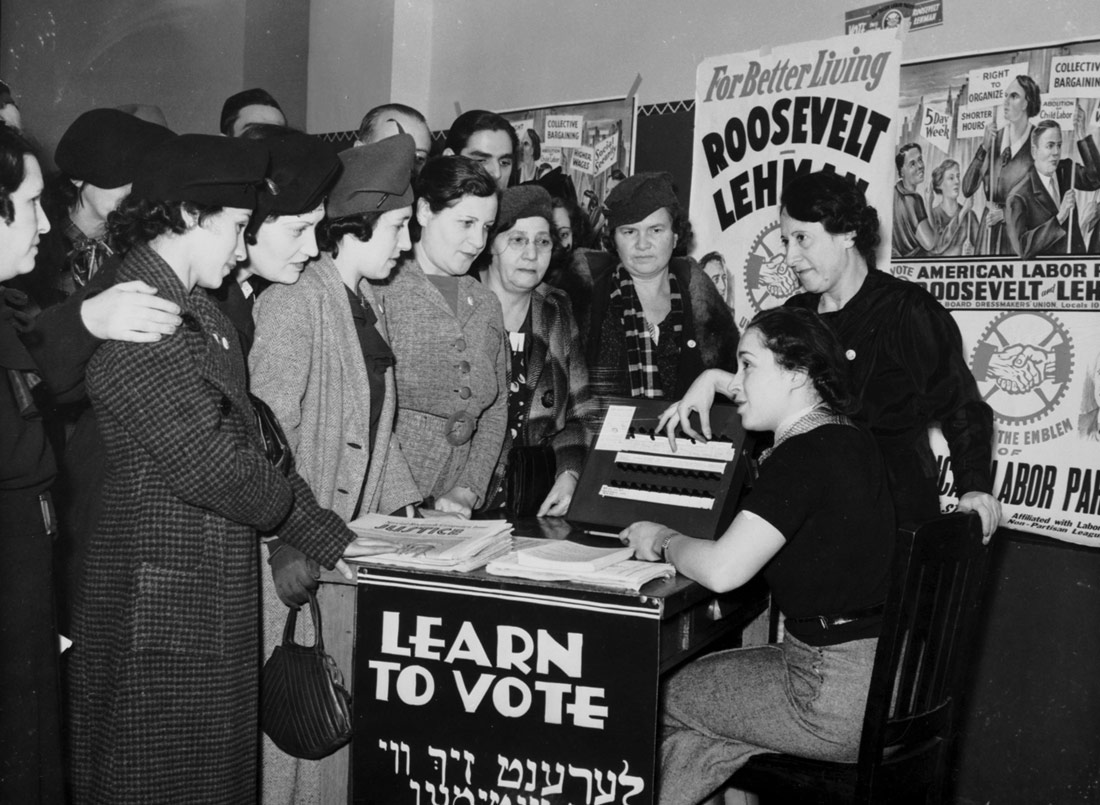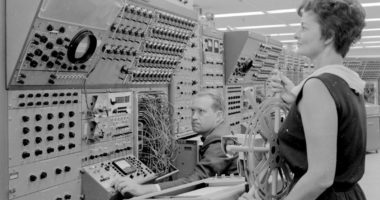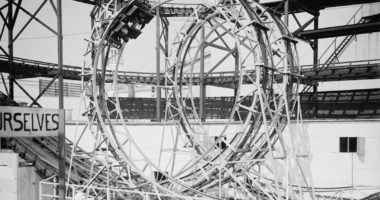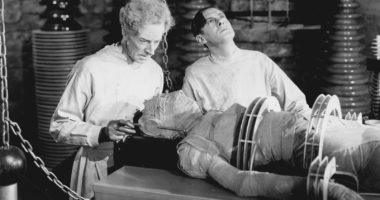
Women teach other women how to vote, 1935 | Kheel Center | CC BY
New tools such as big data, algorithms and artificial intelligence could help us to address social problems and to rethink our model of democracy. Cases of malpractice and corruption could be avoided, public investment would be optimised, and we could even delegate our vote to virtual agents that we would train according to our preferences. We’ll be talking about all of this with MIT Media Lab researchers Luis Pastor (City Science group) and César Hidalgo (Collective Learning group).
In 2015, Hamburg wanted to present a candidacy to host the Olympic Games. It contacted the City Science group at Media Lab, a worldwide pioneering innovation centre at the Massachusetts Institute of Technology (MIT) for help in designing the future Olympic village and making a successful bid.
But then everything changed. Overnight, the task facing researchers at the Media Lab was a quite different one. Tens of thousands of Syrian refugees started to arrive in this German city. The mayor still wanted to host the Olympics, but how? What was to be done about the refugees? Where to locate them? And, above all, how to do it efficiently, integrating them into the metropolitan ecosystem and not creating ghettoes?
“This was the challenge that the mayor of Hamburg presented us with, and which we had to meet in just two months: how to find a place for over 70,000 refugees in a city of almost two million inhabitants”, tells Madrid architect Luis Pastor, research scientist in the City Science group. “The mayor also wanted to stimulate public debate and bring about a bottom-up participative process to decide jointly with the people of Hamburg where these refugees could be placed”, he adds.
The scientists at MIT Media Lab contacted HafenCity University Hamburg and together they used algorithms, artificial intelligence and human intelligence to address the issue. They used demographic data about the refugees, as well as data about the city, such as planning regulations for each district, numbers of schools, hospitals, clinics, laws in different areas, and cultural, economic and social diversity. And they developed a tool for human-computer interaction called CityScope, to encourage citizen participation and decision-making.
“The first thing we did was to try to understand how people were using the city and, based on this understanding, generate simulation models to try to answer the question ‘What would happen if…?’. For example, if the city’s public transport suddenly had to cater for another 10,000 people”, continues Alonso, in the space his research group has in the Media Lab’s impressive futuristic glass building, full of models of cities with projections of real-time data about their citizens, traffic and weather. It depends. On each project.
The researcher then organised a citizen participation process, bringing together representatives of different sectors of society, “from far right to far left”, to debate and choose where to place those immigrants. “These were workshops using the data we had at our disposal, where participants had to decide where to place the immigrants”, explains Alonso.
The project, which they named FindingPlaces, was a resounding success. It allowed some 400 Hamburg people to identify 160 locations for the newcomers. “We found that these committees told us the same as the algorithm, and now there are over 10,000 refugees who have found a home in the city, around whom a working economic ecosystem is being generated. The citizens of Hamburg are seeing results. What’s more, the project prompted a constructive collaborative interaction, and generated social awareness about the refugees and a feeling of empowerment among the participants”, concludes Alonso.
FindingPlaces is an example of how new tools like big data, algorithms and artificial intelligence can help us to address social issues and even rethink our model of society and democracy.
“Democracy can be updated or improved using technology and new ideas, I’m absolutely convinced”, concurs Chilean physicist César Hidalgo, director of Collective Learning, another MIT Media Lab group. “In the future, we will be able to automate several of the tasks of governments. Politicians will be augmented by algorithms that work with teams of specialists to truly serve the people”, he added controversially.
Hidalgo’s group, made up of physicists, computer engineers, psychologists, economists, geographers and designers, sets out to dissect how countries, organisations, teams and regions learn, and how to use that knowledge to improve society. Hidalgo is currently working on an ambitious new project about what he calls “augmented democracy”.
“We have a political system that is imperfect, that has worked in practically the same way for the last two hundred years. And it can be improved”, argues this physicist, who thinks the first thing we have to change is the subject of our discourse: shifting the focus of debate from the who to the how. “We have the tools to empower citizens and promote their participation. We could avoid many cases of corruption or poorly designed or unnecessary projects.”
The concept of augmented democracy emerged just a year ago, when Hidalgo was in Chile presenting another project. At a meeting with journalists of a digital newspaper, he started to talk about the age-old relation between democracy and journalism. In theory, says Hidalgo, newspapers write stories to tell people about the behaviour of politicians so they can make better decisions about which leaders or parties to support. The problem is that it’s very hard to get beyond the tip of the iceberg.
“Artificial intelligence can help us generate counterfactual information”, says Hidalgo. “Imagine you could take all the laws that parliament or congress is voting on, and enable society to vote on them, too. You’d then be able to compare political representatives with their voters.”
The problem is that having the population take part in voting each law would be extremely expensive and complicated. In Spain, there are actually some projects to try to promote the implementation of direct democracy, such as decide.madrid.es.
ARVE Error: src mismatch
url: https://www.youtube.com/watch?v=r_Fdhdxj_98&list=PLhnvwI6F9eqWqN8vyiZtfpV8SO11ague2
src in: https://www.youtube-nocookie.com/embed/r_Fdhdxj_98?list=PLhnvwI6F9eqWqN8vyiZtfpV8SO11ague2
src gen: https://www.youtube-nocookie.com/embed/r_Fdhdxj_98
But what if we could delegate our vote? “With a virtual agent, like an avatar, we could do just that. This is an algorithm that learns about you, about your preferences, which you train, that feeds on your data and predicts your choice”, explains Hidalgo. And just as our thinking evolves, the algorithm evolves with it. With us.
To return to the example of the newspaper, the media could have a platform where users can register and train their avatar to make predictions. The newspaper could in each case compare what congress or a given politician voted to what the population voted. “The fourth estate can use artificial intelligence as a way of achieving a higher rate of participation and offering counterfactual information”, says Hidalgo.
Imagine that you could participate in the distribution of the state, local or regional budget for public investment. Imagine you could participate by giving a score to the things that matter most to you, be it education, transport, or recreation in different neighbourhoods. Having these scores, for example, would give the government a very precise picture of the people’s priorities. “This is highly valuable information for government technocrats who are trying to design ways to optimise public investment.”
The thought of being able in the future to leave our decision-making to a virtual mini-me who predicts what we would choose in each situation is controversial for many. Hidalgo, like Alonso, insists that the algorithms we have in the future, whether to go shopping for us or tell our political candidates what we think about different subjects, will not decide for us. They will help us in the way we choose. “They are a tool, like a bicycle; they don’t work on their own. It’s you who decides where you want to go; the bicycle just helps you get there faster”, he explains.
But as citizens, do we want to make decisions constantly, in an era when we have access to a vast quantity of information and are always being asked to make choices?
“Algorithms are going to be an absolute revolution that will help us cope with excess information. They have to be tools created by citizens, working in an open distributed system. Your avatar can, in a moment, access specific information of yours on your computer or in the cloud. It is a system of which you ask a question, and it answers”. And these algorithms will be auditable continuously, by behaviour and by code.
“This is clearly a revolution. What we aim to do is to start exploring the edges of technology. It might take 60 or 80 years to mature. My daughter is four years old; when she’s my age, the idea of applying artificial intelligence to democracy will seem obvious. She’ll have received an education about what algorithms are, how data behaves, very different to that of present-day generations. We are designing this for the users of the future. It’s a slow transformation, a revolution, for future citizens, to whom we have to leave better institutions than the ones we found.” The agora will still be the town square, but it will also, and most of all, be in the cloud.





Marc Ngui | 27 June 2018
Thanks for sharing this info. It is quite heartening!
Leave a comment